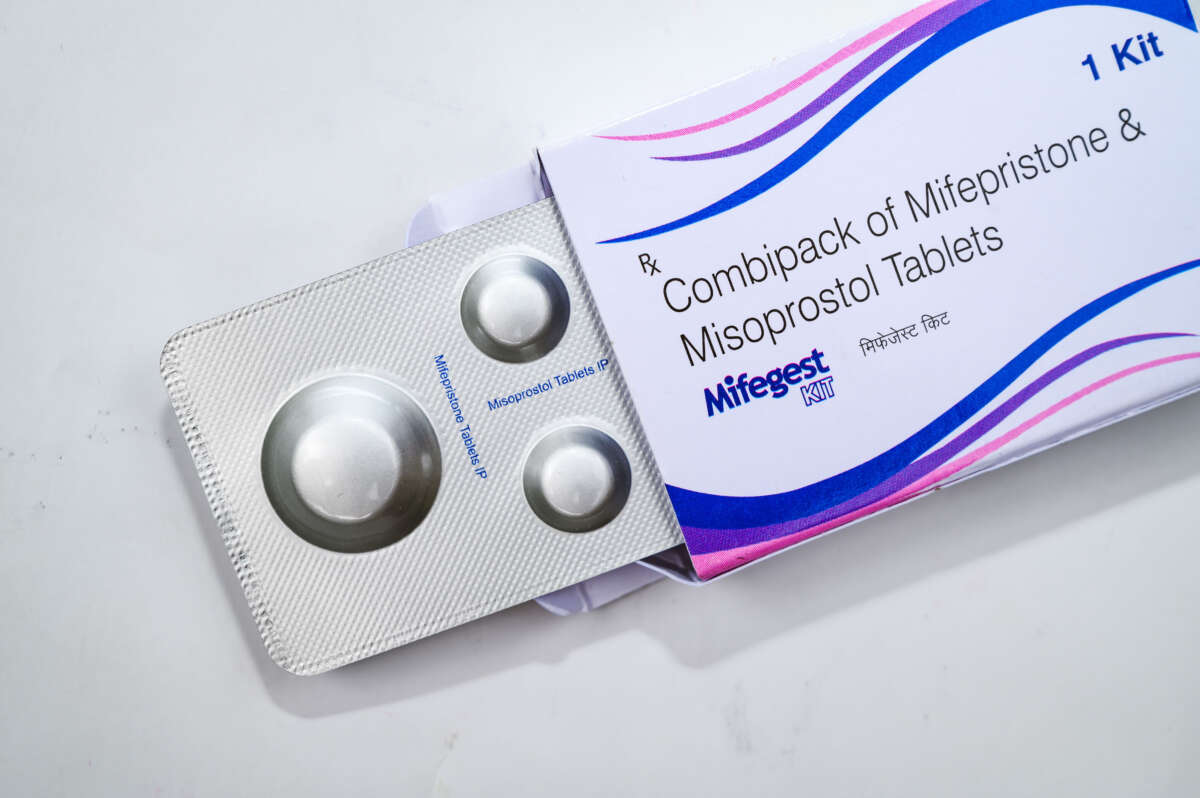Support justice-driven, accurate and transparent news — make a quick donation to Truthout today!
The motion of three Republican-led states to join the case determining the accessibility of the abortion pill mifepristone has been rejected by the U.S. Supreme Court.
On April 7, 2023, notoriously conservative Judge Matthew Kacsmaryk, district judge of the U.S. District Court for the Northern District of Texas, ruled in favor of a coalition of anti-abortion medical practitioners challenging the Food and Drug Administration’s (FDA) approval of mifepristone. After Kacsmaryk banned the medication, the Fifth Circuit of Appeals partially vacated his decision, but reinstated pre-2016 restrictions on the medication that include prohibiting its prescription via telemedicine and dispensation via mail — measures that greatly inhibit people’s access to the abortion pill. The Supreme Court has scheduled oral arguments in this case for March.
The exclusion of the states from participating in the appeal could significantly impact the viability of the case, because at the heart of the appeal is the issue of whether the anti-abortion medical practitioners have the standing to bring the case at all.
The plaintiffs contend that they have legal standing because of the risks they could encounter in treating patients with complications from medication abortions, citing debunked studies about the safety of the medication. In fact, the studies they relied upon to support their arguments have since been retracted from Sage Publications after independent experts reviewed the research and found that its conclusions were “unsupported,” “misleading” and “unreliable.”
If Missouri, Idaho, and Kansas had been allowed to intervene in the appeal, they would have supplemented the plaintiff’s lack of standing. The states argued that they had standing in pursuing the case because they have to use public funds to treat their citizens who face complications after leaving the state to get mifepristone and then returning. The Supreme Court’s denial of the state’s motion to intervene in the appeal weakens the plaintiffs’ argument that any party in the case has been harmed by the availability of mifepristone.
However, while Missouri, Idaho, and Kansas will not be allowed to intervene in the appeal of this case, Kacsmaryk has allowed the Republican-led states to join the original lawsuit in district court despite complaints from the FDA that the states’ motion was not timely. This means that even if the Supreme Court determines that the anti-abortion groups initiating the original lawsuit lack the legal standing to sue, the states might still attempt to continue the case.
The American College of Obstetricians and Gynecologists (ACOG) asserts that mifepristone is highly safe and efficient. In May, ACOG, along with a coalition of other medical bodies, submitted a friend-of-the-court brief to the U.S. Court of Appeals for the Fifth Circuit, urging the court to preserve access to the abortion pill. “Denying or limiting access to mifepristone will not make patients safer — it will actively jeopardize their health,” the health organizations said in the brief.
An amicus brief filed with the Supreme Court from the Reproductive Freedom Alliance, a coalition of 22 governors who support protecting abortion rights, has also said that endangering people’s access to the abortion pill would exacerbate harm.
“If the Court affirms [the Fifth Circuit Court’s ruling], the upshot will be harm all around: harm to women, particularly rural and low-income women, who will be required to visit in-person clinics simply to take a prescription medication, or may not be able to access mifepristone for abortion or miscarriage management at all; harm to providers, clinics, and health systems, who will be overwhelmed with demand; harm to Governors, whose critical tools to safeguard public health will be unnecessarily curbed; and harm to the public fisc, which will bear the brunt of many of the economic costs of the decision,” the brief says.
Press freedom is under attack
As Trump cracks down on political speech, independent media is increasingly necessary.
Truthout produces reporting you won’t see in the mainstream: journalism from the frontlines of global conflict, interviews with grassroots movement leaders, high-quality legal analysis and more.
Our work is possible thanks to reader support. Help Truthout catalyze change and social justice — make a tax-deductible monthly or one-time donation today.
